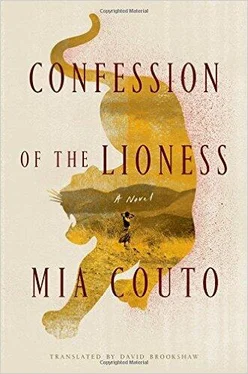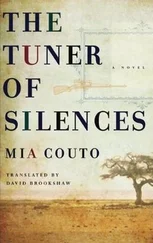There’s one thing I don’t understand. Is it true that you understand what Roland is saying in that strange way of talking he has?
Suddenly I realize how close I am to my father’s suspicions when confronting the fidelity of my mother’s letters. My God, how like Henry Bullseye I am! Luzilia is far from my thoughts when she replies:
Don’t forget I’m a nurse. And then I’ve been looking after him for so long! I listen to your brother like someone reading another person’s palm.
Nor should I forget that Roland could make use of the written word. It had always been his weapon, his refuge. From her trousers pocket, Luzilia draws two sheets of paper. She chooses the most crumpled one and gives it to me. It’s a letter from Roland, I recognize the handwriting of the well-behaved, eternal child. I don’t like reading out loud. I feel weak, ridiculous, denuded. For that reason, I read it in an undertone.
My dear brother: I imagine my condition must pain you. I want to tell you that I don’t suffer. On the contrary, I’m happy because I can never again be a Bullseye. I have shed my inherited name with the same pleasure that some widows burn the clothes of their tyrant husband. After that shot, I no longer feared what I had been. No further crime awaits me. I am empty, like only a saint can be. Do you remember what our mother would call us? My angels, that’s what she would say. Here in this asylum, there’s no need for demons or angels. All we have is ourselves, and that’s enough. Yes, I killed our father. I killed him and will kill him again every time he’s reborn. I obey orders. Those orders were given me without the need for any words. It was enough to see my mother’s sad look. Don’t pity me, dear brother. At first, my alibi was madness. Then, it became my absolution. Our mother always warned me: A bullet kills in both directions. When I killed old Bullseye, I committed suicide. Once, after our mother’s death, you said: If only I could die. Well, now I’m telling you. It’s not death that confers absence upon us. The only way to cease existing is to go mad. Only a madman gains vacuity.
Those lines confirmed my age-old suspicion: My brother pretended he was mad. The only truly sick creature was me, with my tormented nights, and my cruel memories of a half-lived past.
Can I ask another question? Did you and my brother ever make love?
Luzilia doesn’t answer. She merely smiles sadly. She unfolds the second sheet and waves it in front of me.
Do you recognize this?
It’s my old letter, that unlucky missive in which, many years ago, I declared my love. Without saying any more, Luzilia walks toward me, her sad smile now taking on an enigmatic air. She kisses me.
Let’s go to Kulumani, let’s go to your room.
We can’t. The writer shares the space with me.
Let’s go to Palma, we’ll be more relaxed there.
We get into the car. Her hand stops me from turning the ignition. And she whispers in my ear:
You were right, this is your last hunt. I’m coming to get you …
We set off in silence, Luzilia’s hand still perched on my arm.
Tonight … And she pauses, seeking the right word.
Yes?
Tonight, make me scared of myself.
I look at the sandy road that unfolds in front of us, with more bends in it than distance, and I think: To live is to wait in hope of what may be lived.
Mariamar’s Version: SEVEN. The Ambush
Be careful of lions. But be more careful of the goat that lives in the lion’s den.
— AFRICAN PROVERB
Ever since the hunter arrived, the days have gone by, dense but empty like the clouds in winter. During this whole time, I have remained shut away, a prisoner in my own home, peeping out at the failed preparations for the hunting expeditions. I heard my father’s footsteps echoing through the early hours of the morning and the noise of the jeep would have me throwing myself at the window to get a glimpse of Archie Bullseye.
Little by little, though, my interest in my beloved began to fade. Why didn’t he send me some sign that he might be interested in seeing me again? There was only one true answer: I had died as far as he was concerned. There was no point in prolonging the illusion. It was this profound deception that made me give up. I no longer wanted to escape from the house; I could forgo a meeting with the hunter. I could do without the river, travel, dreams.
* * *
I wasn’t the only one disappointed in Archie Bullseye. The village elders were impatient, and began to hold meetings in the shitala , while an atmosphere of conspiracy began to take a grip on Kulumani. Florindo Makwala, the administrator, began to be seen at these meetings of the elders. His presence there was something unheard-of in the village. Makwala had always drawn a line between himself and the world that he called “traditional,” had always distanced himself from engaging with invisible matters. That was why people were puzzled by his sudden interest.
* * *
This afternoon, something unexpected happens. The administrator, Florindo Makwala, comes to our house. It’s not the custom for chiefs to leave their residence in order to discuss matters of governance. But this time Makwala has come to ask for favors. Shut away in the living room, he and my father confer for some time. I begin to fear that I may be the subject of negotiation. This fear is confirmed when I am later summoned to receive a disturbing command:
Tonight, you’re to go with the administrator! Genito Mpepe declares.
But aren’t I in prison? I ask.
You’re going to sleep over there, in his house , my father affirms, embarrassed.
In the visitor’s presence I manage to contain myself, though deep down I feel annihilated. The moment Florindo leaves, however, my entreaty gushes out:
Father, don’t do this to me. For the love of God, I don’t want to—
What you want has nothing to do with it.
But, ntwangu , please, think carefully , my mother declares, unexpectedly taking up my defense. That Florindo, that miserable worm …
Mpepe won’t brook any dissent. We should keep quiet. Did we know that, at the dead of night, there were conspiracies against his person? Did we realize how weak and isolated he was? Doing the administrator favors was his golden opportunity to regain his protection and respect.
In silence, my mother prepares my bath, dresses me, and combs my hair. The sun is starting to go down when she escorts me to Florindo Makwala’s residence. She stands in the road without moving as she watches me enter the garden, and even calls me:
Your scarf, girl …
And she passes her hand over my face, pretending to tidy my hair. She lingers, gripped by her very gesture. She takes her time looking at me before saying:
Don’t worry, my girl, you’re very pretty.
And she sets off home. I stand there alone, undecided, at the entrance of what the administrator always insisted was not a “house” but a “residence.” My hesitation is brief: The administrator comes to greet me at the door and invites me into his office. There’s a large sofa that he promptly occupies while I look around at the walls, where there’s a huge calendar with a Chinese woman lying lecherously across the hood of a car.
The photo of His Excellency is missing because your mother, Hanifa, was cleaning it and ended up breaking the glass. I’m awaiting funds to order a new frame …
I stand there waiting while he withdraws into himself, his head bowed over his knees.
I’m so desperate, Mariamar!
Читать дальше












